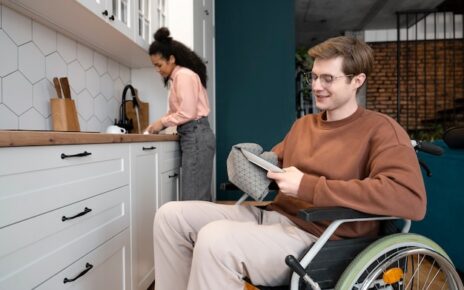Introduction:
It might be difficult to navigate college with a disability, but with the correct accommodations, it can be an exciting and growth-oriented trip. We go into the world of disability accommodations in higher education in this thorough guide, covering the significance, kinds, difficulties, and advantages of these accommodations.

Understanding Disability Accommodations:
Disability accommodations are essential provisions that ensure equal access to education for individuals with disabilities. These accommodations aim to level the playing field, enabling students with disabilities to fully participate in academic activities without barriers. From physical disabilities to learning disorders, accommodations are tailored to meet the unique needs of each student.
Legal Framework:
The legal landscape surrounding disability accommodations in higher education is robust. Laws such as the Americans with Disabilities Act (ADA) and Section 504 of the Rehabilitation Act mandate that institutions provide reasonable accommodations to students with disabilities. These laws protect students from discrimination based on their disabilities and uphold their right to equal educational opportunities.
Types of Accommodations:
Academic Accommodations:
- Extended time for exams
- Note-taking assistance
- Access to assistive technology
- Alternative format materials (e.g., audio or Braille)
Physical Accommodations:
- Wheelchair ramps and accessible pathways
- Reserved seating in classrooms
- Adjustable desks and furniture
Environmental Accommodations:
- Reduced distraction testing environments
- Priority registration for classes
- Flexible attendance policies
Challenges Faced:
Despite legal mandates and institutional efforts, challenges persist in the realm of disability accommodations in higher education. Some common hurdles include:
- Lack of awareness about available accommodations
- Insufficient resources and funding
- Attitudinal barriers and stigma
- Inadequate training for faculty and staff
- Bureaucratic hurdles in the accommodation request process
Benefits of Disability Accommodations:
The benefits of disability accommodations extend far beyond academic success. By providing equal access to education, accommodations empower students with disabilities to:
- Excel academically and achieve their full potential
- Build confidence and self-advocacy skills
- Foster inclusivity and diversity within the campus community
- Prepare for future employment and societal integration
Best Practices for Implementing Accommodations:
- Promote awareness and education about available accommodations.
- Establish clear and streamlined procedures for requesting and implementing accommodations.
- Provide ongoing training for faculty and staff on disability awareness and accommodation strategies.
- Foster a culture of inclusivity and support for students with disabilities.
- Regularly evaluate and update accommodation policies and practices to meet evolving needs.
Conclusion:
In higher education, providing accommodations for students with disabilities is not just required by law but also morally right. Institutions can help all students reach their full potential by embracing diversity and offering equal access to education, regardless of their skill level. Let’s work together to build a future where all people can prosper and achieve success in higher education.





2 Replies to “Disability Accommodations in Higher Education”
Comments are closed.